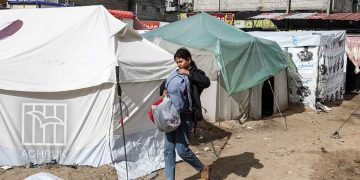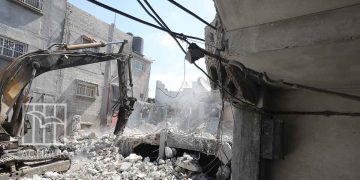Palestinian youth Louay Faisal Muhammad Nasrallah, 22, from Jenin Governorate, died at Israel’s Soroka Medical Center after being suddenly transferred from the Negev Desert Prison, where he had been held under administrative detention since March 26, 2024.
No official details have been released about the circumstances of his death, as Israeli authorities maintain complete silence regarding his medical condition and the events leading up to his hospital transfer.
According to his family, Nasrallah had no known health issues before his detention, raising serious suspicions of mistreatment or medical neglect during his imprisonment. Such practices have become alarmingly routine within Israeli prisons, with an increasing number of unexplained deaths among Palestinian detainees.
Nasrallah’s death adds to a long and growing list of victims of Israel’s prison system. Since the start of the most recent Israeli assault, at least 73 named detainees have died in custody. The true number may be higher, as other cases remain hidden due to Israel’s policy of enforced disappearance. Since 1967, a total of 310 Palestinian prisoner deaths have been officially documented.
This case exemplifies the systemic violations faced by Palestinian detainees—from indefinite administrative detention without charge or trial, to torture, medical neglect, harsh imprisonment conditions, and deprivation of basic care. These acts constitute flagrant breaches of international humanitarian law and the Geneva Conventions, particularly the Third and Fourth Conventions.
The Negev Prison, where Nasrallah was held, is notorious for severe health and living condition abuses. The facility has been the site of a scabies outbreak among prisoners, with accusations that Israeli authorities have weaponized the disease by deliberately withholding or delaying treatment as a form of collective punishment.
Nasrallah’s death reflects a broader policy aimed at physically and psychologically exhausting Palestinian detainees. It is part of a larger apparatus of oppression exercised by the Israeli occupation against the Palestinian people, especially those behind bars. Data suggest that many detainee deaths result directly or indirectly from mistreatment, qualifying as war crimes and crimes against humanity.
Louay Nasrallah entered prison as a healthy young man and left it as a lifeless body. His death is yet another alarm bell for the international community, underscoring that what takes place in Israeli prisons is not mere neglect or administrative failure, but a systematic policy of silent abuse, carried out under the watch of a world that too often looks the other way.


























